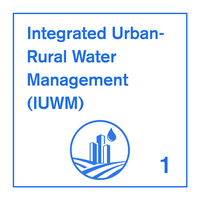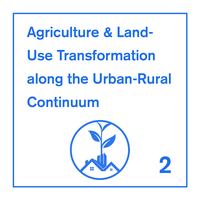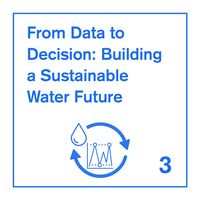Conference Themes 2024

The traditional business-as-usual approach to urban water management has massively complicated and hindered urban development pathways with dynamically designed and adaptable infrastructure and technologies. A forward-looking IUWM approach means a paradigm shift from a traditional set of technologies to a synergistic (dynamic) relationship and solutions for urban agglomerations and the interplay with adjacent rural areas. The successful linkage between the urban system and the watershed requires social participation and integrated management to achieve optimal social, economic and environmental outcomes. This will ensure that the processes and outcomes meet the requirements of sustainability.
The integrated approach to urban-rural water management requires interdisciplinary approaches and the bringing together of components that affect urban water management, such as stormwater and flood protection, wastewater treatment, water supply and solid waste, and rural areas with watersheds, groundwater and agricultural activities. This interaction between urban and rural areas can be seen, for example, in the effects caused by the disproportionate growth of urban areas. For example, the availability and quality of water in the surrounding rural areas can be affected by excessive and uncontrolled water consumption and the discharge of untreated wastewater, which in turn affects the general quality and availability of water.
IUWM is a highly complex field with a multitude of boundary conditions, dynamic processes and optimization requirements, in which individual site conditions (political, administrative, social and technological) must also be taken into account. This is where the use of AI makes sense. The use of AI can close the gap of intelligent supporting infrastructure in integrated urban-rural water management projects and help to realize smart management and monitoring, e.g. with regard to autonomous operation, intelligent inspection, remote control
and emergency measures on site. Furthermore, AI can be used to optimize the determination of the Urban Water Security Index as a reliable decision-making criterion for planners in the field of urban water management.
The contributions and discussions related to integrated urban-rural water management will focus particularly on the
following aspects:
- Urban-rural continuum and urban spatial planning
- Urban-rural water security
- Big data and AI in urban-rural water management

The predicted population growth in urban areas worldwide will lead to enormous challenges in the supply and distribution of water, food, and energy. For this reason, rural and urban areas must be interlinked, and strategies developed to ensure the efficient use and exchange of resources. Sustainable agricultural production and landscape management with innovative concepts for urban areas and transition zones are necessary to ensure livelihoods and environmental health along the urban-rural continuum. Land-use concepts should target increased urban primary productivity, shortening resource cycles, efficient water use and increased water quality as well as an improved urban climate in adaptation to increasing temperatures. In this thematic area the conference will particularly focus on how agricultural systems can be interfaced efficiently along the rural-urban continuum regarding resource availability, food production, social peace, health, ecological sustainability, urban climate management and related themes.
The contributions and discussions related to the agriculture topic area will focus particularly on the following
aspects of the rural-urban continuum:
- Agricultural production systems in transition between rural and urban areas
- Innovation & resource use in urban agriculture
- Water pathways and food webs affecting markets, people, and livelihoods along the rural-urban continuum.

In a world facing an escalating crisis of water scarcity and the intensifying pressures of climate change, embracing data-driven decision-making has become paramount for optimizing the utilization of this vital resource - guaranteeing equitable access for all. Real-time information from sensor networks, satellites, and citizen initiatives provides valuable insight into the state of our water resources, both in terms of their quantity and quality. Using an open-science approach fosters transparency and collaboration between researchers, policymakers, practitioners, and communities, breaking down silos and promoting knowledge sharing. Besides, effective knowledge management is key. Data curation, analysis, and visualization transform complex information into actionable insights, empowering stakeholders to proactively navigate water challenges. Particularly universities and research institutions play a vital role as hubs for innovation, research, and capacity building, fostering the next generation of water data experts.
However, utilizing the power of data alone is not enough. While open science and knowledge management unlock the insights from diverse sources, we must go further and consider the broader connections within water resource management. This is where “nexus thinking” comes into play. Recognizing the interconnectedness of water with food, energy, and the environment, we can leverage data to develop integrated (e.g., nature based) solutions or implement hybrid approaches that combine cutting-edge technology with traditional methods. Through combined efforts and the implementation of data-driven approaches, we can achieve optimal water resource management, enhance resilience to challenges, and establish a sustainable future where all have access to this essential resource. Consequently, Theme 3 invites researchers, policymakers, and practitioners to share their insights on data-driven strategies, open science approaches, nexus thinking, and knowledge management.
The contributions and discussions related to information technologies and managing urban water data will focus
particularly on the following aspects:
- Sensing Change: Open Data for Regional Water & Climate
- Transforming Data into Action: Knowledge Management for Water Security
- Connecting the Dots: From Data to Water-Energy-Food Solutions
